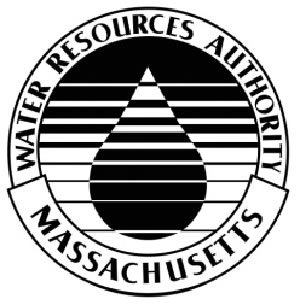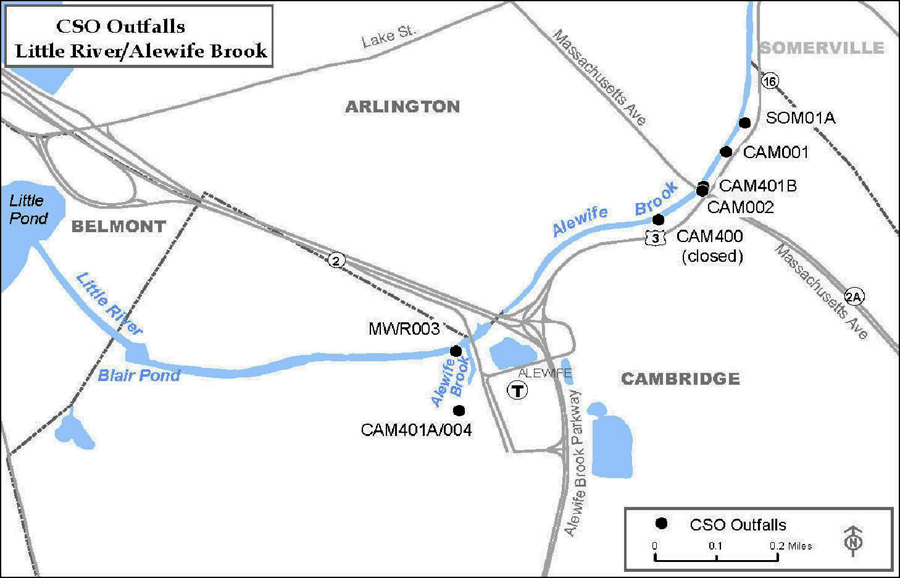FOR IMMEDIATE RELEASE
Ria Convery, MWRA
(617) 788-1105 ria.convery@mwra.state.ma.us
Owen O’Riordan, Cambridge Department of Public Works
(617) 349-4845
Robert King, Somerville Public Works
(617) 625-6600, ext. 5410
|
|
|
MWRA |
City of Cambridge |
City of Somerville |
JOINT PUBLIC NOTICE
APRIL 2013
Alewife Brook Combined Sewer Overflow Progress Update
This notice is required by the Massachusetts Department of Environmental Protection (DEP) as an annual update on the progress of Combined Sewer Overflow (CSO) control measures that are underway to improve the water quality of Alewife Brook. You are receiving this notice because your property lies within the extended, 100-year floodplain of Alewife Brook as established and currently in effect by the Federal Emergency Management Agency (FEMA). The water quality of Alewife Brook is often impaired due to bacteria and other pollutants from a number of sources, including cross connections between sanitary sewers and storm drains, urban stormwater runoff, and CSOs. During both wet and dry weather, the water quality of Alewife Brook can be impaired and fail to meet state bacteria standards for fishing and swimming. Portions of Cambridge and Somerville are served by combined stormwater and sanitary sewer systems common in older cities. Seven CSO outfalls along Alewife Brook can release an untreated mix of stormwater and sanitary flow during large storms when stormwater can overwhelm the capacity of the combined sewers. While these discharges may impair water quality, they provide critical relief to the sewer system when flows exceed capacity, preventing sewage backups into homes, businesses and streets. As part of the Federal District Court Order in the Boston Harbor Case (D. Mass. C.A. No. 85-0489-RGS), the Massachusetts Water Resources Authority (MWRA) is required to undertake certain corrective actions to reduce or eliminate CSO discharges along Boston Harbor, the Mystic, Charles and Neponset Rivers and Alewife Brook. MWRA, in cooperation with the cities of Cambridge and Somerville, is currently designing and constructing several projects that, when completed, will significantly reduce CSO discharges to the Alewife Brook. Substantial design and construction progress has been made and significant work is underway to implement the six projects that comprise the long-term CSO control plan for Alewife Brook on schedules mandated by the Federal District Court Order as follows: 1. CAM004 Stormwater Outfall and Wetland Basin (CambridgePark Drive Area Drainage Improvements and Stormwater Wetland Project) will convey stormwater flows removed from the combined sewer system to an innovative stormwater wetland. The constructed wetland basin will attenuate the stormwater flows and provide an additional level of water quality treatment prior to draining the stormwater to the Little River and Alewife Brook. The wetland will also contribute to the ecological and recreational goals of the Department of Conservation and Recreation’s (DCR) Master Plan for the Alewife Reservation. Cambridge commenced construction in spring 2011. Although Cambridge will complete the stormwater conduit and the wetland basin by the end of April 2013, in compliance with MWRA’s Federal Court Order, construction of other project-related improvements to the Alewife Reservation will continue through September 2013. 2. CAM004 Sewer Separation (Alewife Sewer Separation Project: Huron A, Huron B and Concord Avenue) will install new storm drains in neighborhoods along Huron and Concord avenues to remove stormwater from the overburdened combined sewer system, protect Fresh Pond Reservoir, allow Cambridge to eliminate CSO discharges at CSO Outfall CAM004, and reduce CSO discharges at the other outfalls, thereby improving water quality in the Little River and Alewife Brook. Cambridge completed early work along Fresh Pond Parkway in 2000-02 and is now designing and constructing the remaining elements of the project. Cambridge commenced construction of the first of three planned construction contracts (Huron A) in September 2012. Cambridge plans to commence the last two construction contracts (Huron B and Concord Avenue) in 2013 and 2014, respectively, and complete all of the CSO related sewer separation work by December 2015, in compliance with MWRA’s Federal Court Order. Street and sidewalk restoration will continue into 2016 in these areas. 3. CAM400 Manhole Separation removed stormwater from sewer systems in the Whittemore Avenue area by separating manholes that were common to the storm drain and sewer systems. Cambridge completed construction of this project in March 2011, thereby eliminating CSO discharges from CSO Outfall CAM400 and converting it to a dedicated stormwater outfall. 4. Interceptor Connection Relief and Floatables Control upgraded the connections between Cambridge’s and MWRA’s sewer systems to provide greater capacity and also fitted certain CSO outfalls with floatables control. Cambridge completed construction of this project near the intersection of Alewife Brook Parkway and Massachusetts Avenue in October 2010. 5. Control Gate and Floatables Control at Outfall MWR003 and Rindge Ave. Siphon Relief will help minimize overflows while controlling sewer system flooding in very large storms. The outfall and siphon are located in the Alewife Reservation immediately behind the MBTA Alewife Station. MWRA commenced design of this project in March 2012 and recently completed the preliminary design and hydraulic model investigations. Construction is scheduled to begin by August 2014 and be complete by October 2015, in compliance with the Federal Court Order. 6. Interceptor Connection Relief and Floatables Control at Outfall SOM01A will reduce CSO discharges from Somerville’s Tannery Brook Conduit and provide floatables control for remaining discharges. The outfall is located off Alewife Brook Parkway just north of Massachusetts Avenue. MWRA commenced design of this project in March 2012 and recently attained 100% completion of the construction contract documents. Construction is scheduled to begin by September 2013 and be complete by June 2014, in compliance with the Federal Court Order. Together, these projects are predicted to reduce average annual CSO volume to Alewife Brook by 85% (from 50 million gallons in 1997 to 7.3 million gallons), reduce the frequency of discharges from 63 times a year to seven times a year on average, reduce the number of CSO outfalls from an original 8 to 5, and bring CSO discharges into compliance with Class B (“fishable/swimmable”) water quality standards 98% of the time. Work already completed by MWRA, Cambridge and Somerville has significantly reduced the number of CSO events and the total volume discharged annually to the brook. The ongoing work is in addition to sewer separation work completed by the City of Somerville in the 1980s and 1990s that closed several other CSO outfalls. MWRA estimates that the average annual CSO discharge volume to Alewife Brook is less than half what it was in 1997, primarily as a result of the work Cambridge has completed to date to implement MWRA’s long-term control plan, as well as improvements completed by MWRA in 2008 to upgrade pumping capacity at its Alewife Brook Pump Station. The long-term control plan projects are scheduled to be complete by December 2015, in compliance with the Federal Court Order. It is important to understand that floodwaters in all cases can present health risks, and proper precautions are necessary to minimize these risks during flooding events. Public health officials recommend avoiding contact with the brook during rainstorms and for 48 hours afterwards, as there may be increased health risks due to bacteria or other pollutants. DEP has developed guidance for homeowners for responding to flooding or sewer backups, which can be found at http://www.mass.gov/dep/water/laws/flooding.htm. For more information on CSOs and the CSO control program, visit MWRA’s, Cambridge’s and Somerville’s websites, at www.mwra.com, www.cambridgema.gov/theworks.aspx, and www.ci.somerville.ma.us. MWRA recently issued its CSO Annual Progress Report for 2012, which describes the projects and progress made with the regional long-term CSO control plan. The report also includes a summary presentation of water quality conditions in Alewife Brook and the Mystic River. The report can be found on MWRA’s website at http://www.mwra.com/cso/csoannualreports.htm. |
||||||
###
Posted April 15, 2011



